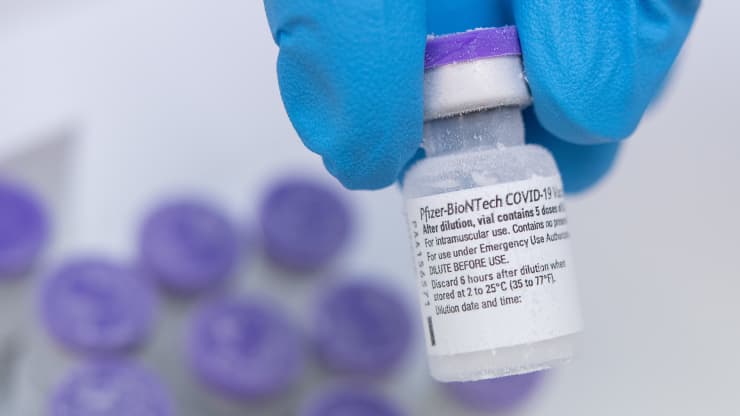
LONDON — A coronavirus vaccine developed by Pfizer and BioNTech appears to be effective against a key mutation in the more infectious variants of the virus discovered in the U.K. and South Africa, according to a study conducted by the U.S. pharmaceutical giant.
It comes as countries scramble to contain the variants that are significantly more transmissible, with public health experts anxious about the potential impact on inoculation efforts.
The research, published Thursday on preprint server bioRxiv and not yet peer-reviewed, suggested the Pfizer-BioNTech vaccine worked to neutralize the so-called N501Y mutation.
The N501Y mutation has been reported in the more infectious variants. It is altering an amino acid within six key residues in the receptor-binding domain — a key part of the spike protein that the virus uses to gain entry into cells within the body.
“These findings are good news for the likely effectiveness of the Pfizer/BioNTech vaccine against these new variants of SARS-CoV-2,” said Dr. Michael Baker, an epidemiologist at the University of Otago in Wellington, New Zealand.
“In other words, the Pfizer vaccine is likely to induce immunity that covers the two new more infectious variants originating in England and South Africa,” he added.
Pfizer and researchers at the University of Texas Medical Branch conducted the study on blood taken from people who had been given the Covid-19 vaccine.
The findings are limited, however, because the study does not look at the full set of mutations found in either of the new rapidly spreading variants.
“Pfizer and BioNTech have tested sera from people immunized with the BNT162b2 vaccine for its ability to neutralize multiple mutant strains,” a Pfizer spokesperson told CNBC via email on Friday, referring to the official name of the Covid vaccine.
“To date, we have found consistent coverage of all the strains tested. The two companies are now generating data on how well sera from people immunized with BNT162b2, may be able to neutralize new strains.”
‘We urgently need data’
Researchers hope to have more data on whether the vaccines work against other mutations found in the U.K. and South Africa variants in the coming weeks, Reuters reported.
“It’s important to note that the study does not actually examine these variants directly but only focuses on one single mutation in these variants (the 501Y mutation),” Dr. Deepti Gurdasani, clinical epidemiologist at Queen Mary University of London, told CNBC via email on Friday.
“So, while it’s reassuring that one mutation within these variants is not associated with escape from vaccines, at least in the laboratory, we urgently need data on these mutations, and preferably on the variant virus with a combination of mutations, as these may act differently in combination.”
The World Health Organization said last month that health authorities were “urgently investigating” whether the N501Y mutation may have any impact on vaccine performance.
Of particular concern is the variant of the virus that emerged in South Africa. That’s because this variant carries two other mutations in the spike protein (E484K and K417N, among others) which are not present in the U.K. strain, named “VOC-202012/01,” with VOC standing for “Variant of Concern.”
Gurdasani said the E484K mutation was “particularly concerning” because it had been associated with significantly reduced neutralization by antibodies in the laboratory.
To date, more than 88.1 million people have contracted the coronavirus worldwide, with 1.9 million deaths, according to data compiled by Johns Hopkins University.
— CNBC’s Holly Ellyatt contributed to this report.

